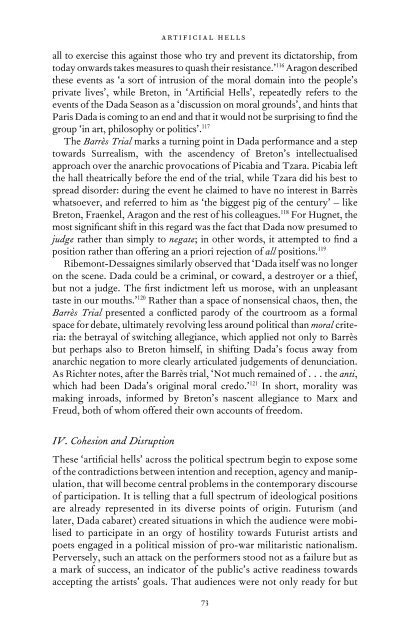Participatory Art and the Politics of Spectatorship - autonomous ...
Participatory Art and the Politics of Spectatorship - autonomous ...
Participatory Art and the Politics of Spectatorship - autonomous ...
You also want an ePaper? Increase the reach of your titles
YUMPU automatically turns print PDFs into web optimized ePapers that Google loves.
artificial hells<br />
all to exercise this against those who try <strong>and</strong> prevent its dictatorship, from<br />
today onwards takes measures to quash <strong>the</strong>ir resistance.’ 116 Aragon described<br />
<strong>the</strong>se events as ‘a sort <strong>of</strong> intrusion <strong>of</strong> <strong>the</strong> moral domain into <strong>the</strong> people’s<br />
private lives’, while Breton, in ‘<strong>Art</strong>ifi cial Hells’, repeatedly refers to <strong>the</strong><br />
events <strong>of</strong> <strong>the</strong> Dada Season as a ‘discussion on moral grounds’, <strong>and</strong> hints that<br />
Paris Dada is coming to an end <strong>and</strong> that it would not be surprising to fi nd <strong>the</strong><br />
group ‘in art, philosophy or politics’. 117<br />
The Barrès Trial marks a turning point in Dada performance <strong>and</strong> a step<br />
towards Surrealism, with <strong>the</strong> ascendency <strong>of</strong> Breton’s intellectualised<br />
approach over <strong>the</strong> anarchic provocations <strong>of</strong> Picabia <strong>and</strong> Tzara. Picabia left<br />
<strong>the</strong> hall <strong>the</strong>atrically before <strong>the</strong> end <strong>of</strong> <strong>the</strong> trial, while Tzara did his best to<br />
spread disorder: during <strong>the</strong> event he claimed to have no interest in Barrès<br />
whatsoever, <strong>and</strong> referred to him as ‘<strong>the</strong> biggest pig <strong>of</strong> <strong>the</strong> century’ – like<br />
Breton, Fraenkel, Aragon <strong>and</strong> <strong>the</strong> rest <strong>of</strong> his colleagues. 118 For Hugnet, <strong>the</strong><br />
most signifi cant shift in this regard was <strong>the</strong> fact that Dada now presumed to<br />
judge ra<strong>the</strong>r than simply to negate; in o<strong>the</strong>r words, it attempted to fi nd a<br />
position ra<strong>the</strong>r than <strong>of</strong>fering an a priori rejection <strong>of</strong> all positions. 119<br />
Ribemont- Dessaignes similarly observed that ‘Dada itself was no longer<br />
on <strong>the</strong> scene. Dada could be a criminal, or coward, a destroyer or a thief,<br />
but not a judge. The fi rst indictment left us morose, with an unpleasant<br />
taste in our mouths.’ 120 Ra<strong>the</strong>r than a space <strong>of</strong> nonsensical chaos, <strong>the</strong>n, <strong>the</strong><br />
Barrès Trial presented a confl icted parody <strong>of</strong> <strong>the</strong> courtroom as a formal<br />
space for debate, ultimately revolving less around political than moral criteria:<br />
<strong>the</strong> betrayal <strong>of</strong> switching allegiance, which applied not only to Barrès<br />
but perhaps also to Breton himself, in shifting Dada’s focus away from<br />
anarchic negation to more clearly articulated judgements <strong>of</strong> denunciation.<br />
As Richter notes, after <strong>the</strong> Barrès trial, ‘Not much remained <strong>of</strong> . . . <strong>the</strong> anti,<br />
which had been Dada’s original moral credo.’ 121 In short, morality was<br />
making inroads, informed by Breton’s nascent allegiance to Marx <strong>and</strong><br />
Freud, both <strong>of</strong> whom <strong>of</strong>fered <strong>the</strong>ir own accounts <strong>of</strong> freedom.<br />
IV. Cohesion <strong>and</strong> Disruption<br />
These ‘artifi cial hells’ across <strong>the</strong> political spectrum begin to expose some<br />
<strong>of</strong> <strong>the</strong> contradictions between intention <strong>and</strong> reception, agency <strong>and</strong> manipulation,<br />
that will become central problems in <strong>the</strong> contemporary discourse<br />
<strong>of</strong> participation. It is telling that a full spectrum <strong>of</strong> ideological positions<br />
are already represented in its diverse points <strong>of</strong> origin. Futurism (<strong>and</strong><br />
later, Dada cabaret) created situations in which <strong>the</strong> audience were mobilised<br />
to participate in an orgy <strong>of</strong> hostility towards Futurist artists <strong>and</strong><br />
poets engaged in a political mission <strong>of</strong> pro- war militaristic nationalism.<br />
Perversely, such an attack on <strong>the</strong> performers stood not as a failure but as<br />
a mark <strong>of</strong> success, an indicator <strong>of</strong> <strong>the</strong> public’s active readiness towards<br />
accepting <strong>the</strong> artists’ goals. That audiences were not only ready for but<br />
73
















